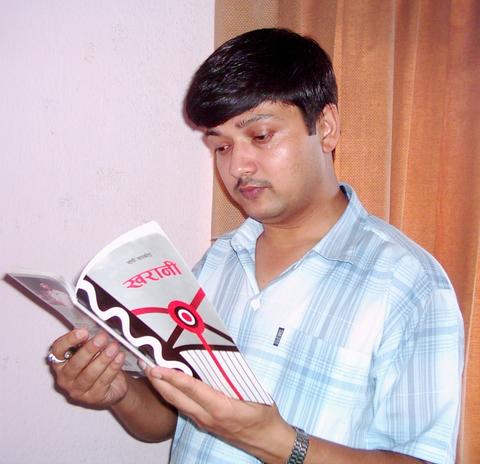I was thinking to write something about Kishore Pahadi for my blog on what I think about his writing but I didn’t find time when I was in Nepal. I was passing very busy schedules in Kathmandu. And, when I came to London, it was wonderful for few days to wander around and enjoy the new place. But later again, I was busy to search the job. Once I got the job, I engaged again.
But today when I saw Kishore Pahadi’s Face Book, I was again reminded of what I was thinking for long time. It was quite impressive to see all the books that he wrote as author, co-author, translator or editor. His first book was co-authored with Ashesh Malla, and it was a collection of short stories. It was ‘Katha Kon’. Some of the stories from this collection were dramatised and were performed by Sarwanaam.
‘Ghar-Khandahar’ was another collection of short stories and it was his first sole book. I remember reading few stories from ‘Bishudai’. Most of the stories in this collection are excellent and this book was also awarded with Sajha Purashkar, an award given to the best book of the year by the Sajha Publication. I freshly remember one scene of Bishu dai, where Bishu dai paints his canvass with blood as he didn’t have money to purchase the colour.
‘Saharma Batti Niveko Bela’ is the collection of poems by Kishore Pahadi. I couldn’t exactly remember any poem right now, but I remember once he was reciting few poems from this collection in Ratnanagar of Chitwan, and received huge clapping.
‘Tyo Talako Malik’ is a collection of translated stories from different international writers. Parashu Pradhan acknowledged this book as an inspiration to translate and edit the ‘B ishwa Prashiddha Yaun Kathaharu’. ‘Kimwadanti’ is a collection of short short stories. One time, Khem Aryal and I started translating those stories into English. Khem finished his part, but I couldn’t finish my one.
ishwa Prashiddha Yaun Kathaharu’. ‘Kimwadanti’ is a collection of short short stories. One time, Khem Aryal and I started translating those stories into English. Khem finished his part, but I couldn’t finish my one.
Another collection of his stories is ‘Sarbaghya Ra Sex’. It was his famous book. I remember the author presented a pen which was watching the secret romance of a woman in the absence of her husband.
He wrote couple of books for children. When I was Assistant Editor for Sunkeshra, the monthly magazine for children, I had an opportunity to be the first reader of those stories. ‘Lamlamti Dam’ was the collection of such short stories for children. It’s nice to see that he is writing continuously and I wish all the best for his writing.
But today when I saw Kishore Pahadi’s Face Book, I was again reminded of what I was thinking for long time. It was quite impressive to see all the books that he wrote as author, co-author, translator or editor. His first book was co-authored with Ashesh Malla, and it was a collection of short stories. It was ‘Katha Kon’. Some of the stories from this collection were dramatised and were performed by Sarwanaam.
‘Ghar-Khandahar’ was another collection of short stories and it was his first sole book. I remember reading few stories from ‘Bishudai’. Most of the stories in this collection are excellent and this book was also awarded with Sajha Purashkar, an award given to the best book of the year by the Sajha Publication. I freshly remember one scene of Bishu dai, where Bishu dai paints his canvass with blood as he didn’t have money to purchase the colour.
‘Saharma Batti Niveko Bela’ is the collection of poems by Kishore Pahadi. I couldn’t exactly remember any poem right now, but I remember once he was reciting few poems from this collection in Ratnanagar of Chitwan, and received huge clapping.
‘Tyo Talako Malik’ is a collection of translated stories from different international writers. Parashu Pradhan acknowledged this book as an inspiration to translate and edit the ‘B
 ishwa Prashiddha Yaun Kathaharu’. ‘Kimwadanti’ is a collection of short short stories. One time, Khem Aryal and I started translating those stories into English. Khem finished his part, but I couldn’t finish my one.
ishwa Prashiddha Yaun Kathaharu’. ‘Kimwadanti’ is a collection of short short stories. One time, Khem Aryal and I started translating those stories into English. Khem finished his part, but I couldn’t finish my one.Another collection of his stories is ‘Sarbaghya Ra Sex’. It was his famous book. I remember the author presented a pen which was watching the secret romance of a woman in the absence of her husband.
He wrote couple of books for children. When I was Assistant Editor for Sunkeshra, the monthly magazine for children, I had an opportunity to be the first reader of those stories. ‘Lamlamti Dam’ was the collection of such short stories for children. It’s nice to see that he is writing continuously and I wish all the best for his writing.












